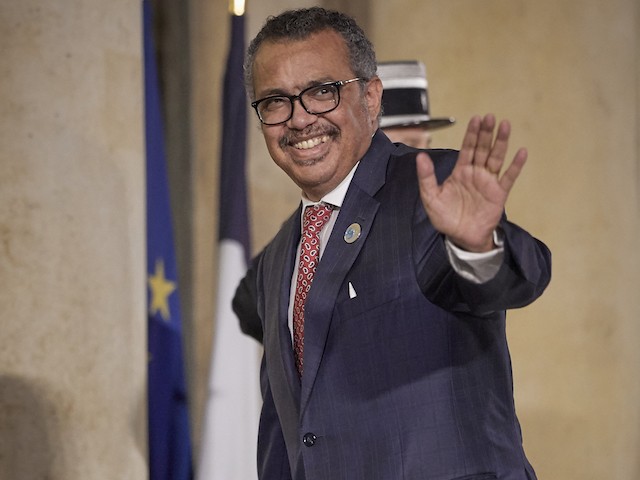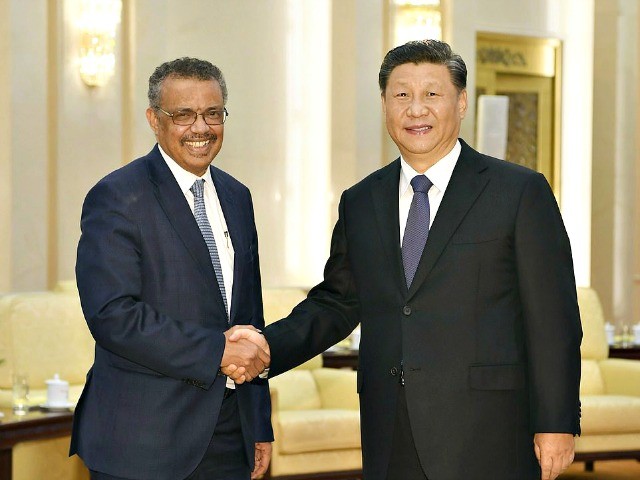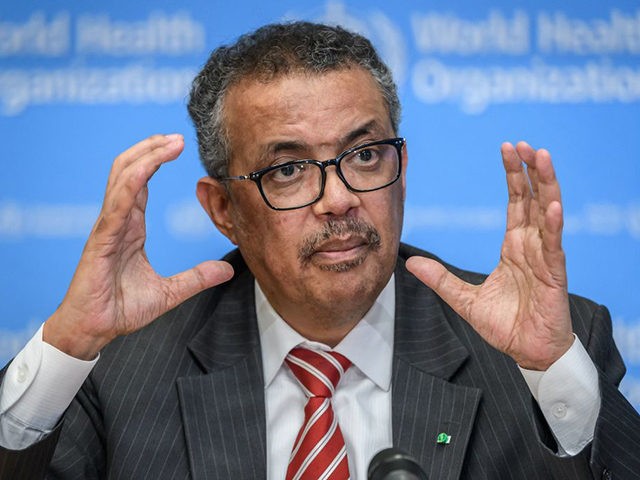Countries belonging to the World Health Organization (W.H.O.) voted this week to increase their own membership fees by 20 percent, resulting in a $6.83 billion budget for the next year, “the most ambitious to date.”
The members made the decision during the World Health Assembly, the W.H.O.’s annual meeting for decisionmaking and planning priorities for the next year. The record budget allocation has followed a disastrous tenure for Director-General Tedros Adhanom Ghebreyesus marked by the W.H.O. sharing catastrophic Chinese government disinformation on the Wuhan coronavirus pandemic, its refusal to allow the nation of Taiwan – which warned of an infectious disease spreading in Wuhan in late 2019 – to participate in its activities, and a sprawling sexual abuse scandal in which dozens of women say W.H.O. employees raped them or sexually exploited them in the Democratic Republic of Congo (DRC).
Tedros was reelected as head of the organization in an uncontested election last year.
For 2024, W.H.O. leaders identified the eradication of polio as a top priority – the only public health emergency of international concern left after the end of the coronavirus and monkeypox emergencies – and investment into the United Nations “sustainable development goals,” a list of actions intended to address the “climate crisis.”
“Member States agree to the WHO’s Programme Budget for 2024-2025, committing to a 20% increase of assessed contributions (membership fees),” the U.N. agency announced on Monday. “The budget to deliver on this programme was also agreed, at US$ 6.83 billion, the most ambitious to date, and which includes a historical 20% increase of assessed contributions (or membership fees).”

World Health Organization (WHO) Director General Tedros Adhanom Ghebreyesus at the Élysée Palace for the inaugural dinner of the Paris Peace Forum on November 11, 2021 in Paris, France. (Kiran Ridley/Getty Images)
W.H.O. officials claim the money will be invested in global universal healthcare coverage, investments in scientific medical development, “more people enjoying better health and well-being” generally, and “efficient” support to countries facing medical emergencies.
In its budget proposal, the agency noted that country membership fees are a small percentage of the W.H.O.’s total funding.
“The Organization’s ability to make an impact is limited by a funding model in which only 14% of WHO’s funding is fully flexible and predictable (while the remaining funds are dependent on generous donors, heavily earmarked and arrive at unpredictable times),” the budget noted. The W.H.O. elaborates on its website that member states have decreased contributions over time, resulting in the agency becoming more dependent on “voluntary contributions where donors direct funding according to their priorities.”
“In both assessed and voluntary funding, Member States contribute directly nearly 60% of the programme budget, and another 14% comes from other organizations in the United Nations system, partnerships and development banks which are themselves largely funded by governments,” the W.H.O. details. “Nearly 10% of WHO’s funds come from philanthropic foundations, predominantly the Bill & Melinda Gates Foundation.”
Embattled W.H.O. chief Tedros Adhanom Ghebreyesus was warmly applauded Sunday by China’s Communist regime. https://t.co/Gu6drtfcFl
— Breitbart News (@BreitbartNews) May 24, 2020
Tedros justified the demands for more funding, despite formally ending the coronavirus emergency this month, in his report to member states at the World Health Assembly on Monday, warning that a new, and deadlier, pandemic could begin at any time.
“The end of COVID-19 [Wuhan coronavirus] as a global health emergency is not the end of COVID-19 as a global health threat,” Tedros asserted. “The threat of another variant emerging that causes new surges of disease and death remains. And the threat of another pathogen emerging with even deadlier potential remains.”
“When the next pandemic comes knocking – and it will – we must be ready to answer decisively, collectively and equitably,” he asserted.
“And pandemics are far from the only threat we face,” Tedros continued. “In a world of overlapping and converging crises, an effective architecture for health emergency preparedness and response must address emergencies of all kinds.”
Tedros also boasted of the W.H.O.’s achievements in the past five years, including pressuring states to adopt “health tax” policies. Among the specific successes he identified were Kazakhstan imposing a new tax on heated tobacco products, Nigeria addressing trans fats, and Ukraine banning e-cigarettes, or vapes, in public spaces. Tedros also said he was “proud” of countries adopting the W.H.O.’s anti-baby formula zealotry.

Tedros Adhanom, Director General of the World Health Organization, (L) shakes hands with Chinese President Xi Jinping before a meeting at the Great Hall of the People, on January 28, 2020 in Beijing, China. (Naohiko Hatta – Pool/Getty Images)
In his remarks, Tedros only mentioned the W.H.O.’s sexual abuse scandal in passing, vowing, “we are also continuing in our efforts to transform the way this organization prevents and responds to sexual misconduct, and to achieve gender equality.”
Meeting with American Health and Human Services Secretary Xavier Becerra on Tuesday, Tedros claimed to have addressed “preventing sexual misconduct” with the Biden administration’s representative at the World Health Assembly.
Very glad to meet with my friend @SecBecerra to discuss 🇺🇸's critical role in global health security, incl. in the #PandemicAccord and International Health Regulations negotiations. Thanked him for 🇺🇸's support around sustainably financing @WHO and preventing sexual misconduct. pic.twitter.com/dKTHvb3U4C
— Tedros Adhanom Ghebreyesus (@DrTedros) May 23, 2023
Despite the record budget, W.H.O. senior adviser Walid Ammar complained on Tuesday that the agency was “overstretched” in resources.
Ammar claimed “said funding and staffing gaps were widening in the face of ever-increasing demands,” according to Channel News Asia (CNA), which accused the W.H.O. of rescinding accreditation to two of its reporters this week on the grounds that they held Taiwanese citizenship. Ammar identified 53 “high-level” emergencies the W.H.O. was addressing and claimed “climate change” was adding to the list of emergencies through exacerbating the frequency and intensity of natural disasters.

COMMENTS
Please let us know if you're having issues with commenting.